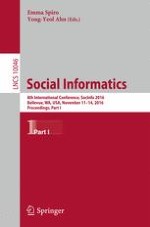2016 | OriginalPaper | Chapter
Social Politics: Agenda Setting and Political Communication on Social Media
Authors : Xinxin Yang, Bo-Chiuan Chen, Mrinmoy Maity, Emilio Ferrara
Published in: Social Informatics
Publisher: Springer International Publishing
Activate our intelligent search to find suitable subject content or patents.
Select sections of text to find matching patents with Artificial Intelligence. powered by
Select sections of text to find additional relevant content using AI-assisted search. powered by
